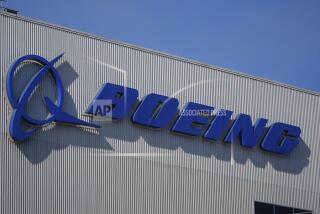San Bernardino County Strike by Lockheed Workers Takes Toll
- Share via
UPLAND, Calif. — “My savings? My savings are gone,” said a young striker who identified himself only as Mark, standing outside a small Lockheed Corp. facility that makes flight-data recorders for military aircraft. “I’m just telling the creditors to hold off.”
Those kinds of stories are making the rounds with increasing frequency in San Bernardino County as a strike by 935 Lockheed workers in Upland, Chino and Ontario approaches the end of its seventh week--far longer than either the workers or Lockheed officials expected.
At the urging of a federal mediator, representatives of Lockheed and the International Assn. of Machinists on Wednesday held their first discussions since the strike began on March 12.
The strike began hours after a potentially much larger Lockheed strike at the company’s Burbank and Palmdale plants was averted.
About 6,000 workers represented by machinists District 727 at Lockheed’s aircraft production plants in Burbank and Palmdale ratified a new contract on March 11 after previously voting against an initial management offer.
The next day, the San Bernardino County employees, represented by machinists District 821, struck in protest of the fact that Lockheed was offering them less than the company had given District 727. The District 821 employees had been working without a contract since their old one expired last November.
Lockheed spokesman John Dailey said the corporation, the nation’s sixth-largest defense contractor, “couldn’t afford” to match the Burbank-Palmdale offer because the Upland, Chino and Ontario operations are not production facilities. Most of the work involves maintenance and modification, now involving the Air Force C-130 transport plane.
The facilities have continued to operate with more than 1,000 supervisors and salaried employees picking up the slack, officials say. Union members contend that the pace of modification work has been slowed.
Union spokesman Bob Gregory said Lockheed’s offer is substantially worse than the Burbank-Palmdale contract because it does not include the immediate $2,500 signing bonuses that workers there were given, puts new restrictions on cost-of-living increases and freezes wages of certain employees.
Dailey said the company wants to change the system by which it calculates cost-of-living increases, a proposal that was made and then withdrawn in the Burbank-Palmdale negotiations. He also said a government audit indicated that about 100 union members were being “significantly overpaid” and that the company wants to adjust those workers’ pay by temporarily halting wage increases.
According to Gregory, “What the machinists here are saying is that regardless of where you work, a machinist (union member) is worth ‘X’ amount of dollars per hour, whether you are working on a C-130 or a missile.”
Dailey would not disclose the company’s pay offer. The Burbank-Palmdale workers will receive 11% raises over three years in addition to the signing bonuses.
The strike has been complicated by some rank-and-file anger at local district officials as well as persistent complaints--voiced widely during Lockheed’s recent proxy fight with Dallas billionaire Harold Simmons--that the corporation is sloppily managed.
“In 25 years in manufacturing I’ve never been involved in such an inept place,” said Roger Bellamy, who said he recently quit his job at the Upland facility after seven years with Lockheed to take a job with Boeing in Seattle.
“We’ve got a weak company and a weak union,” complained another striker, Dick Busch.
Busch said he believed that some strikers’ resolve was hardened last week by the heart-attack death of one striking Upland worker who had been urged by fellow strikers to cross the picket line because of mounting financial and personal difficulties but refused to do so.
Strikers receive $100 a week from the union in exchange for picketing duties.
More to Read
Inside the business of entertainment
The Wide Shot brings you news, analysis and insights on everything from streaming wars to production — and what it all means for the future.
You may occasionally receive promotional content from the Los Angeles Times.










